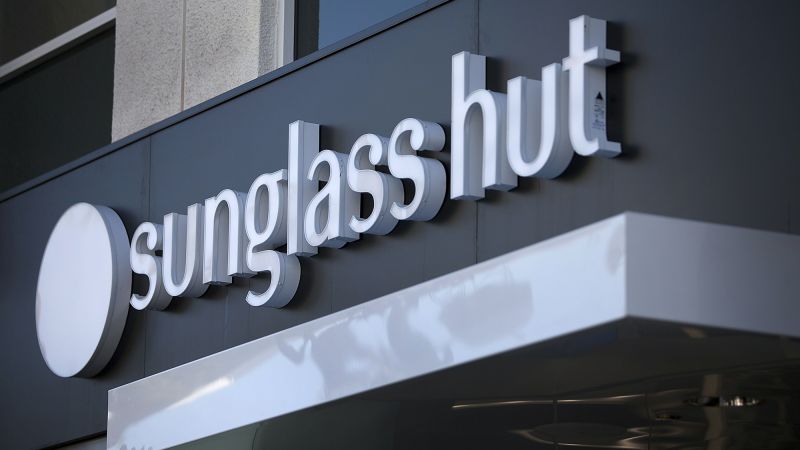A Texas man is suing Macy’s and the parent company of Sunglass Hut after the two companies allegedly relied on error-prone facial recognition technology to falsely accuse him of armed robbery.
After being held in jail for nearly two weeks, Harvey Murphy Jr. was released once prosecutors verified he had not been physically present in the state when the robbery occurred, Murphy’s attorney told CNN. During his detention, however, Murphy was allegedly attacked and raped by three men, leaving permanent injuries.
Now, Murphy wants $10 million from the companies for what he alleges was a wrongful arrest based on the negligent use of facial recognition software, in the latest potential case of mistaken identity involving the controversial technology.
“Not a day goes by he doesn’t think about it,” said Murphy’s lawyer, Daniel Dutko, in an interview. “When he was raped by these men, they held a shiv up to his neck.” The filing said the men also threatened to kill Murphy if he reported the assault.
The lawsuit highlights how ordinary people increasingly risk having their lives turned upside down because of algorithms and artificial intelligence. The case was earlier reported by The Washington Post.
The lawsuit filed last week in Harris County district court claims that Sunglass Hut’s parent, the eyewear giant EssilorLuxottica, relied on Macy’s facial recognition tools to falsely identify Murphy in low-quality surveillance footage of the robbery.
The robbery took place in January 2022 when two men entered a Houston Sunglass Hut and threatened store staff with a gun, demanding cash and taking sunglasses from the shelves before fleeing the scene, according to the complaint, which cited police records of the incident.
Macy’s declined to comment, citing the ongoing nature of the litigation. EssilorLuxottica didn’t immediately respond to a request for comment.
It is not clear why or if EssilorLuxottica turned to Macy’s for assistance. The Sunglass Hut targeted in the robbery sits in a small shopping plaza outside of downtown Houston, and the nearest Macy’s is a 10-minute drive away.
But the collaboration led EssilorLuxottica and Macy’s to identify Murphy not only as one of the suspects in the 2022 incident but also as the suspect in earlier robberies affecting both companies, according to the complaint.
After EssilorLuxottica brought the facial recognition match to Houston police, Dutko said, authorities asked a staffer who witnessed the robbery to pick the suspect out of a photo lineup and the staffer identified Murphy.
That led to Murphy’s subsequent arrest at a Department of Motor Vehicles while he was attempting to renew his driver’s license.
At the time of the robbery, however, Murphy had been in Sacramento, California, not Houston, the lawsuit said. The alibi was later proven by his court-appointed attorney and Harris County prosecutors, who promptly dropped the charges.
A spokesperson for the Houston police department declined to comment and referred CNN to the office of the mayor, which did not immediately respond to a request for comment.
“After reviewing the documents, it appears to us that the police were trying to do their job,” Dutko told CNN, when asked why he did not sue the police department. “They were misled by Sunglass Hut and Macy’s and the reason why Murphy was jailed is because of the actions of these companies. We may find information that causes us to add them later, but right now we feel like we have properly named the true bad actors.”
As the lawsuit against Sunglass Hut’s parent and Macy’s unfolds, one of the things Murphy’s lawyers hope to uncover is not only what the relationship is between EssilorLuxottica and Macy’s, if any, but also what facial recognition vendors Macy’s may use and what guidelines Macy’s has in place to assess confidence in a facial recognition match.
“We’re trying to figure out exactly what the rules are, because they’re not telling us anything,” Dutko said. “They go to the police and say, ‘We’ve got your guy, 100%,’ but did they have it 100%? Or was it nine markers out of 10? We just don’t know.”
Murphy’s case joins numerous other instances of alleged mistaken identity due to facial-recognition software. In 2020, the American Civil Liberties Union challenged Detroit’s police department over what the group described as the first known wrongful arrest involving facial recognition. Last year, another Michigan resident sued the city of Detroit over being falsely accused of carjacking.
For years, civil liberties and privacy experts have warned of the risks of overly casual facial recognition use or an overreliance on the technology, and the possibility that algorithmic bias could lead to misidentification, racial discrimination or other unintended consequences.
In September, the Government Accountability Office warned that federal law enforcement agencies have run thousands of AI-powered facial recognition searches without having appropriate training requirements in place for the officials running the searches, highlighting the potential for misuse.
The Federal Trade Commission has increasingly put companies on notice that the rising use of facial recognition and artificial intelligence has created “new threats to privacy and civil rights.”
The use of face- or iris-scanning technologies to identify consumers in places such as stores, airports or sports arenas could lead to increases in identity theft and impersonation, the FTC warned in a 2023 statement. It could also “reveal sensitive personal information about them — for example, that they have accessed particular types of healthcare, attended religious services, or attended political or union meetings.”
In a settlement last year, the FTC banned Rite Aid from using facial recognition in its stores for five years after regulators found the company had falsely accused some customers of crimes or of being likely to engage in shoplifting based on facial recognition scans. Rite Aid said at the time it disagreed with the FTC’s conclusions.
The FTC has similarly moved to restrict Instagram-parent Meta from using facial recognition technology, which Meta has challenged in court.
Read the full article here
